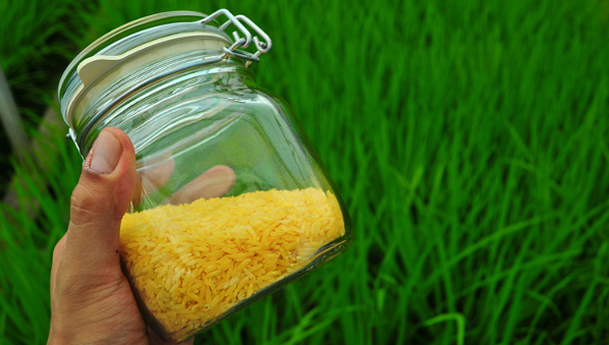Nobel Prize winners campaign for green gene technology
These voices have weight. The debate on genetically modified plants in agriculture has garnered new nourishment from the ranks of top-level research. In an open letter to the governments, 110 Nobel Prize winners, including six German Laureates, have campaigned for the deployment of green genetic engineering.

In an appeal published on 30 June, the scientists also raise serious accusations against the environmental organisation Greenpeace for its opposition to the development of genetically modified organisms (GMOs) in agriculture. The authors of the letter, particularly called attention to Greenpeace’s campaign against Golden Rice, a genetically engineered (GE) crop meant to address vitamin A deficiency. They claim Greenpeace and its supporters distorted the risks and benefits and impacts of the grain, and supported the destruction of approved field trials and research projects. The authors conclude: "opposition on the basis of emotions and dogmas that are contradicted by the data situation must stop."
The use of genetically modified plants in agriculture is a still controversial subject. Opponents of green genetic engineering such as the environmental organisation Greenpeace have boldly warned for many years about the unpredictable consequences of GE for the environment and people, while advocates, the majority of which are researchers, science academies and many church leaders, see it as an important tool to combat hunger in the world. In light of the forecast of the UN Food and Agriculture Organization FAO food shortages during the growing world population, a broad front has now formed of high-calibre researchers, who stand up for the use of genetically modified foods. The organisers of the letter are the biotech entrepreneur Richard Roberts and Nobel laureate Philip Sharp. The plea was pledged on the website supportprecisionagriculture.org
World food security with green gene technology
In order to secure the world's food, in an open letter 110 Nobel laureates in various disciplines as well as more than 2,700 scientists and citizens have called on governments to support the cultivation of genetically engineered plants in agriculture. Among the signatories of the call are German Nobel Laureate Harald zur Hausen, Erwin Neher and Christiane Nuesslein-Volhard, and the German chemical Nobel Prize Trio from 1988, Johann Deisenhofer, Robert Huber and Hartmut Michel. Noteworthy: the Austrian Nobel Prize for literature winner Elfriede Jelinek also appears in the list of the signatories.
Opening reception in the German research ministry
Joachim von Braun, Co-Chair of the Bioeconomy Council, says, "An increasingly biobased economy supports harmony between man and nature in a world that is heading towards a population of more than 9 billion and is affected by climate change and hunger." The German Government also attaches great importance to the bioeconomy. Chancellor Angela Merkel has assumed patronage of the event. During an evening reception in the German research ministry, the summit was officially opended on 24th November. On the occation of the conference, Johanna Wanka, Germany's Minister for Education and Research, emphasizes, "The National Research Strategy BioEconomy 2030 is an important part of the German Government's Sustainable Development Strategy. It supports innovations in the production and use of renewable resources. From an international perspective it helps drive forward sustainable economic and ecological solutions that lead to increased income and higher social standards. This helps to stabilize societies."
Greenpeace asked to rethink
The letter particularly points to the so-called “Golden Rice” project started 20 years ago – a patented strain of rice containing an artificially inserted gene, which boosts the level of vitamin A-rich beta-carotene. The authors vehemently criticise the attitude of the environmental organisation "Greenpeace" and other anti-GMO activists. They write the environmentalists have repeatedly denied incorrect facts and presented incorrect risks and have resisted innovation in agriculture. The Nobel laureates call for Greenpeace and its supporters to “recognise findings by regulatory authorities and competent scientific bodies” and to "abandon" their campaigns against GM crops and in particular the "golden rice”. The authors consider the opposition of green genetic engineering as a threat to global food security.
In an initial statement, Greenpeace has rejected the scientist’s accusation that it is blocking the introduction of genetically modified rice. “Corporations are overhyping ‘Golden’ rice to pave the way for global approval of other more profitable genetically engineered crops,” said Wilhelmina Pelegrina a campaigner for Greenpeace Southeast Asia. “This costly experiment has failed to produce results for the last 20 years and diverted attention from methods that already work. Rather than invest in this overpriced public relations exercise, we need to address malnutrition through a more diverse diet, equitable access to food and eco-agriculture.” The co-inventors of Golden Rice, the Freiburg plant researcher Peter Beyer, can also only shake his head: “These arguments are logical nonsense,” Beyer said the Süddeutsche Zeitung. “The activists are doing everything to ensure that the rice is not ready, and then they still complain about it.”
A tool against malnutrition
In the ranks of environmentalists, however, there are definitely advocates for the “golden rice”. In 2014, Greenpeace co-founder Patrick Moore started the campaign "AllowGoldenRiceNow" to break down the ideological front of the organisation against GMO rice. The "golden rice" is a genetically modified plant with a high content of beta-carotene (provitamin A), which gives the grains a golden yellow colour. According to estimates by the FAO, around 250 million people worldwide suffer from vitamin A deficiency. The consequences are blindness and infections. Children in Africa and Southeast Asia especially are affected and are dying from it. Therefore not only researchers, but also high-ranking church leaders therefore see the "golden rice" as an appropriate means to combat disease and death due to malnutrition. In 2009, the Vatican argued for the use of genetically modified foods to ensure food security for the world's population. At the time 40 experts signed the paper.
© bioökonomie.de/pg + bb


